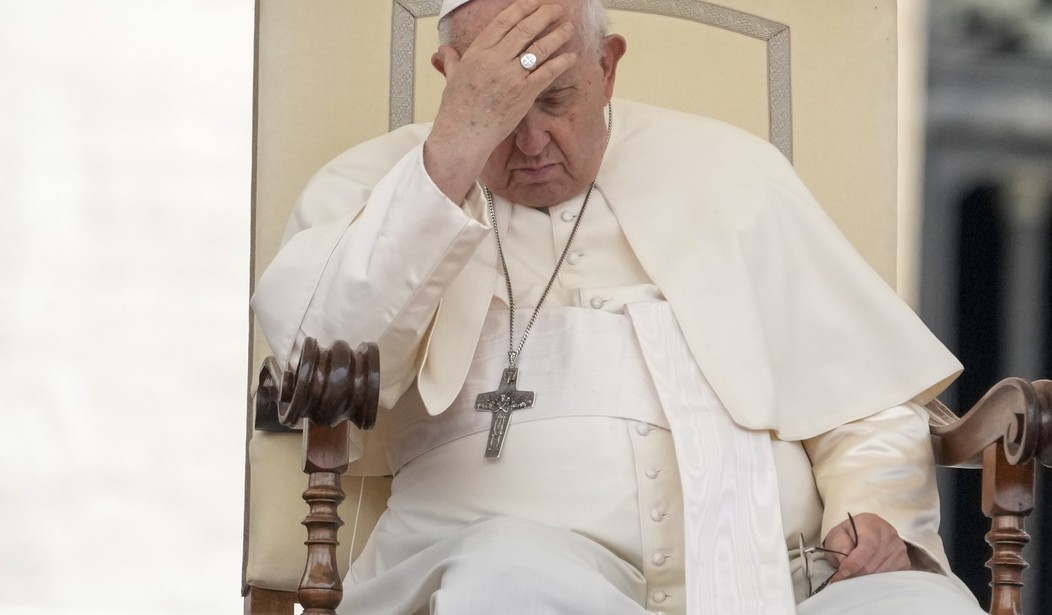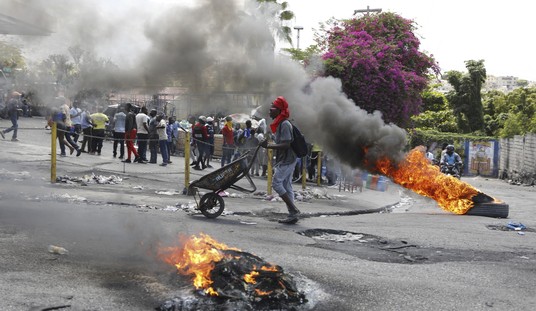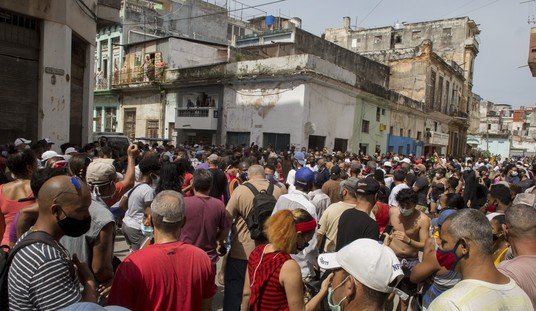What are the most dire words that any Catholic journalist can hear in the mainstream media? “Today, the Vatican/Pope Francis said …” Some of that can be blamed on the pontiff’s lack of precision and care in his off-the-cuff comment, but not today. After chewing on the issue of blessing same-sex unions for the last few months, the Vatican issued a new and reasonably clear statement from its Prefect of the Doctrine of Faith … if one bothers to read it.
So what did it say? Well, if you read the Associated Press and/or ABC News, you would think that same-sex couples can finally get a priest to bless their relationship. Let’s screen-shot their headline:

Pope Francis has formally approved allowing priests to bless same-sex couples, with a new document explaining a radical change in Vatican policy by insisting that people seeking God’s love and mercy shouldn’t be subject to “an exhaustive moral analysis” to receive it.
The document from the Vatican’s doctrine office, released Monday, elaborates on a letter Francis sent to two conservative cardinals that was published in October. In that preliminary response, Francis suggested such blessings could be offered under some circumstances if they didn’t confuse the ritual with the sacrament of marriage.
The new document repeats that rationale and elaborates on it, reaffirming that marriage is a lifelong sacrament between a man and a woman. And it stresses that blessings should not be conferred at the same time as a civil union, using set rituals or even with the clothing and gestures that belong in a wedding.
This isn’t a problem just with the AP or ABC either. Every American outlet has picked this up as “Pope Approves Blessing for Same-Sex Unions” or some version of it.
First off, let’s note the difference between the headline and the lead, because it becomes important later. The headline declares that the Vatican has approved the blessing of “same-sex unions,” but the lead shifts that subtly to “same-sex couples.” That’s our first hint that the Associated Press and/or ABC has failed to make distinctions or even to assess what the Dicastery actually wrote in its declaration today, Fiducia Supplicans – On the Pastoral Meaning of Blessings.
It is not the union being blessed, in other words, nor even the relationship between the two people involved. As the Daily Wire’s Vatican correspondent Bree Dail points out, the document starts with a defense of church teachings on the family, and essentially changes nothing:
The new Prefect of the Doctrine of the Faith states people in “irregular” unions, such as same sex unions, may NOT receive anything resembling liturgical blessings, or blessings of their unions.
They may, however, receive spontaneous blessing, limited to “the invocation of a blessing that descends from God upon those who recognizing themselves to be destitute and in need of his help do not claim a legitimation of their own status, but who beg that all that is true, good, and humanly valid in their lives and their relationships be enriched, healed, and elevated by the presence of the Holy Spirit.
Let’s take a look at the document itself, which is apparently a task too difficult for American news agencies. In its opening, the Dicastery acknowledges the criticisms from the cardinals who issued a Dubia on these issues, and takes pains to limit this declaration to the practice of blessings as a generic opening to faith and not approval:
While the subject matter of this document was being studied, the Holy Father’s response to the Dubia of some Cardinals was made known. That response provided important clarifications for this reflection and represents a decisive element for the work of the Dicastery. Since “the Roman Curia is primarily an instrument at the service of the successor of Peter” (Ap. Const. Praedicate Evangelium, II, 1), our work must foster, along with an understanding of the Church’s perennial doctrine, the reception of the Holy Father’s teaching.
As with the Holy Father’s above-mentioned response to the Dubia of two Cardinals, this Declaration remains firm on the traditional doctrine of the Church about marriage, not allowing any type of liturgical rite or blessing similar to a liturgical rite that can create confusion. The value of this document, however, is that it offers a specific and innovative contribution to the pastoral meaning of blessings, permitting a broadening and enrichment of the classical understanding of blessings, which is closely linked to a liturgical perspective. Such theological reflection, based on the pastoral vision of Pope Francis, implies a real development from what has been said about blessings in the Magisterium and the official texts of the Church. This explains why this text has taken on the typology of a “Declaration.”
It is precisely in this context that one can understand the possibility of blessing couples in irregular situations and same-sex couples without officially validating their status or changing in any way the Church’s perennial teaching on marriage.
This makes it clear that the Church still forbids the blessing of these unions, and for that matter, forbids the blessing of the relationships between “couples in irregular situations,” referring to cohabitating heterosexual couples. What priests can do is offer blessings to the individuals involved in these “irregular situations,” not as a sotto voce approval of sin but as a call to bring them closer to the Lord.
This becomes explicit in paragraphs 5 and 6, which utterly contradict both the headline and lead above:
5. This is also the understanding of marriage that is offered by the Gospel. For this reason, when it comes to blessings, the Church has the right and the duty to avoid any rite that might contradict this conviction or lead to confusion. Such is also the meaning of the Responsum of the Congregation for the Doctrine of the Faith, which states that the Church does not have the power to impart blessings on unions of persons of the same sex.
6. It should be emphasized that in the Rite of the Sacrament of Marriage, this concerns not just any blessing but a gesture reserved to the ordained minister. In this case, the blessing given by the ordained minister is tied directly to the specific union of a man and a woman, who establish an exclusive and indissoluble covenant by their consent. This fact allows us to highlight the risk of confusing a blessing given to any other union with the Rite that is proper to the Sacrament of Marriage.
And again in paragraph 11:
11. Basing itself on these considerations, the Congregation for the Doctrine of the Faith’s Explanatory Note to its 2021 Responsum recalls that when a blessing is invoked on certain human relationships by a special liturgical rite, it is necessary that what is blessed corresponds with God’s designs written in creation and fully revealed by Christ the Lord. For this reason, since the Church has always considered only those sexual relations that are lived out within marriage to be morally licit, the Church does not have the power to confer its liturgical blessing when that would somehow offer a form of moral legitimacy to a union that presumes to be a marriage or to an extra-marital sexual practice. The Holy Father reiterated the substance of this Declaration in his Respuestas to the Dubia of two Cardinals.
So what purpose do the blessings that the people in “irregular situations” can receive have? Blessings have many purposes. Some blessings are very specific to certain actions, such as those associated with marriage. Others ask for the Lord’s favor on objects, homes, people, and so on, which are more general in nature and less tied to an ecclesial status. Fiducia Supplicans differentiates these as “spontaneous” and “non-ritualized” blessings, a common practice for both priests and deacons.
It’s this category of blessing that priests may give individuals in “irregular situations,” not to normalize the situation but to call them to closer communion with the Lord and the Church:
31. Within the horizon outlined here appears the possibility of blessings for couples in irregular situations and for couples of the same sex, the form of which should not be fixed ritually by ecclesial authorities to avoid producing confusion with the blessing proper to the Sacrament of Marriage. In such cases, a blessing may be imparted that not only has an ascending value but also involves the invocation of a blessing that descends from God upon those who—recognizing themselves to be destitute and in need of his help—do not claim a legitimation of their own status, but who beg that all that is true, good, and humanly valid in their lives and their relationships be enriched, healed, and elevated by the presence of the Holy Spirit. These forms of blessing express a supplication that God may grant those aids that come from the impulses of his Spirit—what classical theology calls “actual grace”—so that human relationships may mature and grow in fidelity to the Gospel, that they may be freed from their imperfections and frailties, and that they may express themselves in the ever-increasing dimension of the divine love.
The declaration goes on at length on the nature of these blessings, but makes it clear that these are non-judgmental blessings of a very generic nature. They are “simple gestures that provide an effective means of increasing trust in God on the part of the people who ask for them[.]” However, in the very next breath, the Dicastery warns ordained minsters to be “careful that they should not become a liturgical or semi-liturgical act, similar to a sacrament.” Their nature is a simple call for mercy and strengthening of faith, to which all are called, even those outside the faith.
We actually see this in action at every Mass:
When a Catholic who cannot take communion receives a blessing by approaching the Altar with his/her arms crossed, and is blessed, what is the priest approving of?
Certainly not the situation which prevents the person receiving communion.
— Adrian Yalland (@AdrianYalland) December 18, 2023
And just in case anyone has missed the point, the declaration once again emphasizes that priests cannot use ritual-related blessings or offer any spontaneous blessing that confers recognition or approval of such “irregular situations”:
39. In any case, precisely to avoid any form of confusion or scandal, when the prayer of blessing is requested by a couple in an irregular situation, even though it is expressed outside the rites prescribed by the liturgical books, this blessing should never be imparted in concurrence with the ceremonies of a civil union, and not even in connection with them. Nor can it be performed with any clothing, gestures, or words that are proper to a wedding. The same applies when the blessing is requested by a same-sex couple.
So … what’s changed? Literally nothing, except the Vatican has once again closed the door on recognizing “irregular situations” in cohabitation, regardless of their orientation. Priests and deacons always had the authority to offer spontaneous, non-ritualized blessings on individuals regardless of the status of their communion with the church. This declaration simply reiterates that authority, while emphasizing to priests that they have to take care not to confuse these blessings with those of the marriage rituals, and make sure that those who receive these blessings know the difference. It is actually a warning to the ordained who might otherwise have taken these issues into their own hands.
The Vatican must be shaking its collective head at the spin in the mainstream media to this announcement. They took away the exact opposite of the clear intent of the Dicastery, which was to close the debate on blessing and/or recognizing same-sex unions. This can’t be blamed on papal ambiguity either, but in the failure of journalists to actually read a document and understand the context of the debate at the Holy See for the last decade.
I know this has been a long post, but it takes this kind of effort to expose the MSM’s spin and misdirection. And that kind of time takes a lot of support from our faithful readers — in all senses of the word. This brings me to how we can support free and independent voices and exercise such vigilance. Many of our readers have joined the fight as part of our VIP and VIP Gold membership, and they have been crucial to our operations as an independent platform and the ability to debate all of the issues honestly. We also produce some great exclusive content for our members:
- The Amiable Skeptics featuring Adam Baldwin
- Off the Beaten Path with Larry O’Connor
- The Week in Review with Duane Patterson
- Exclusive columns from Tom Jackson, Duane “Generalissimo” Patterson, and Matt Vespa
- Members-only content from our HotAir team – David Strom, Jazz Shaw, and myself
- Live chats and interactive engagement on all platforms with VIP Gold
- Exclusive access to the comments sections on each post, so that you can join the conversation at HotAir
- And more yet to come!
We talk about this more often now because we see the coming crisis in media more clearly than ever. We hope we can gather as many allies as possible to keep all of these issues in the public square – and indeed to preserve the public square at all.
Join us in the fight. Become a HotAir VIP member today and use promo code SAVEAMERICA to receive a 50% discount on your membership.
Update: My friend Francis Rocca, one of the most reliable Vaticanistas, sees this as as a response to a rebellion among German priests in particular, and an attempt to impose order on the issue more generally:
The eight-page document from the Vatican’s doctrinal office confirms and elaborates on a letter by Pope Francis released in October, which ended the Vatican’s ban on blessing same-sex couples. The shift is the latest sign of the Catholic Church’s greater openness to LGBTQ people under Pope Francis and one that is likely to further disturb conservatives.
Catholic priests in some countries, such as Germany, were flouting the ban and calling for change. The pope’s letter and Monday’s guidelines supersede a 2021 Vatican statement that prohibited blessings for gay couples on the grounds that God “cannot bless sin.”
Frank is very well versed in these issues, and I’ll defer to him on the point about Pope Francis’ earlier letter. However, the document issued today makes it clear that while priests and other ordained ministers can bless individuals (even two at a time), that is the extent of their authority and the meaning of their blessings.
Update: To Frank’s point, this declaration appears to be a clean-up effort to Pope Francis’ October letter, in the context he highlights.
Update: Luke Coppen has an exhaustive explainer at The Pillar now too. He notes that of the sixteen footnotes in the document, fourteen of them are to Pope Francis’ writings — but one of them does refer to the 2021 ruling that same-sex unions cannot be blessed.








Join the conversation as a VIP Member